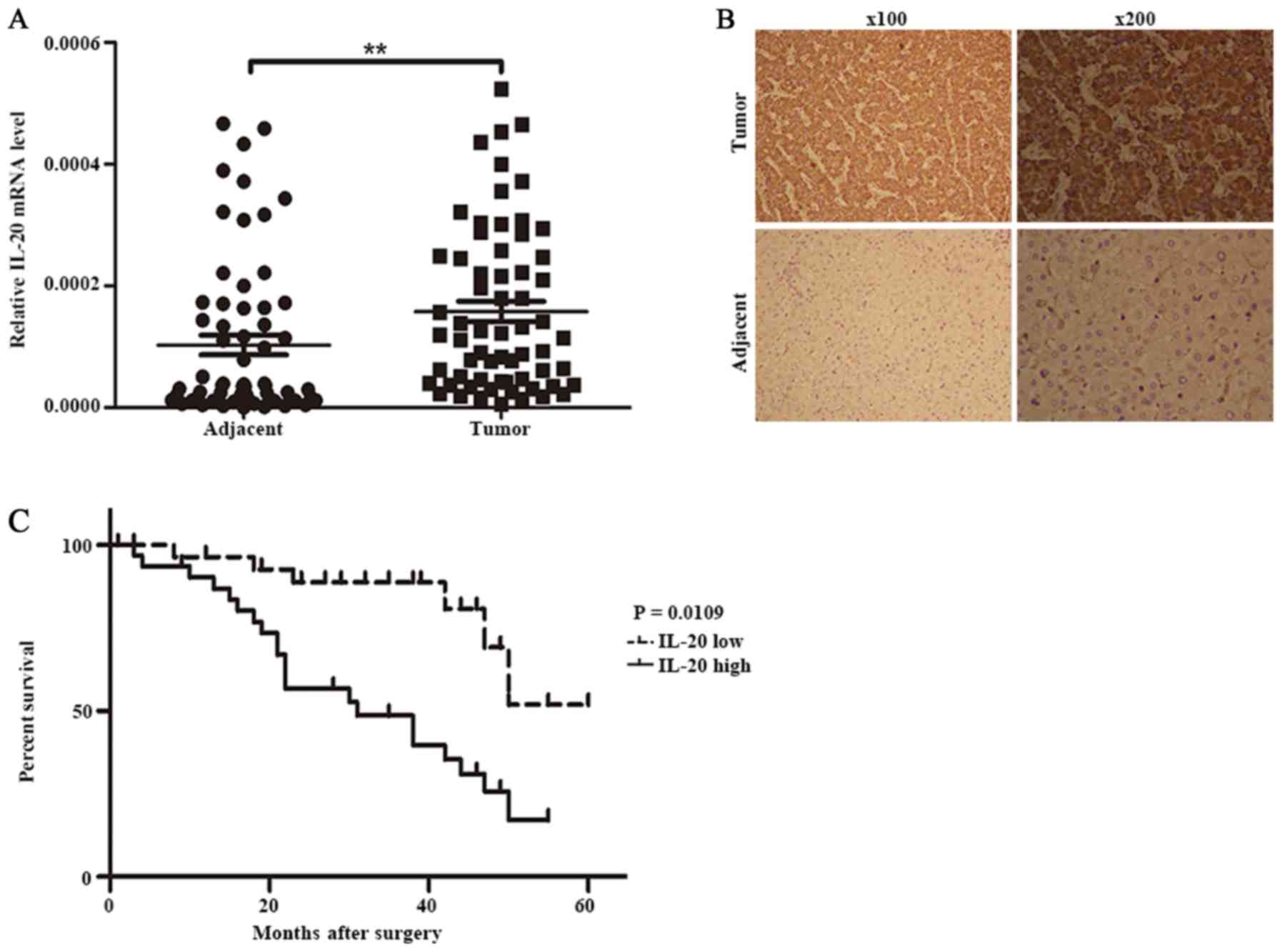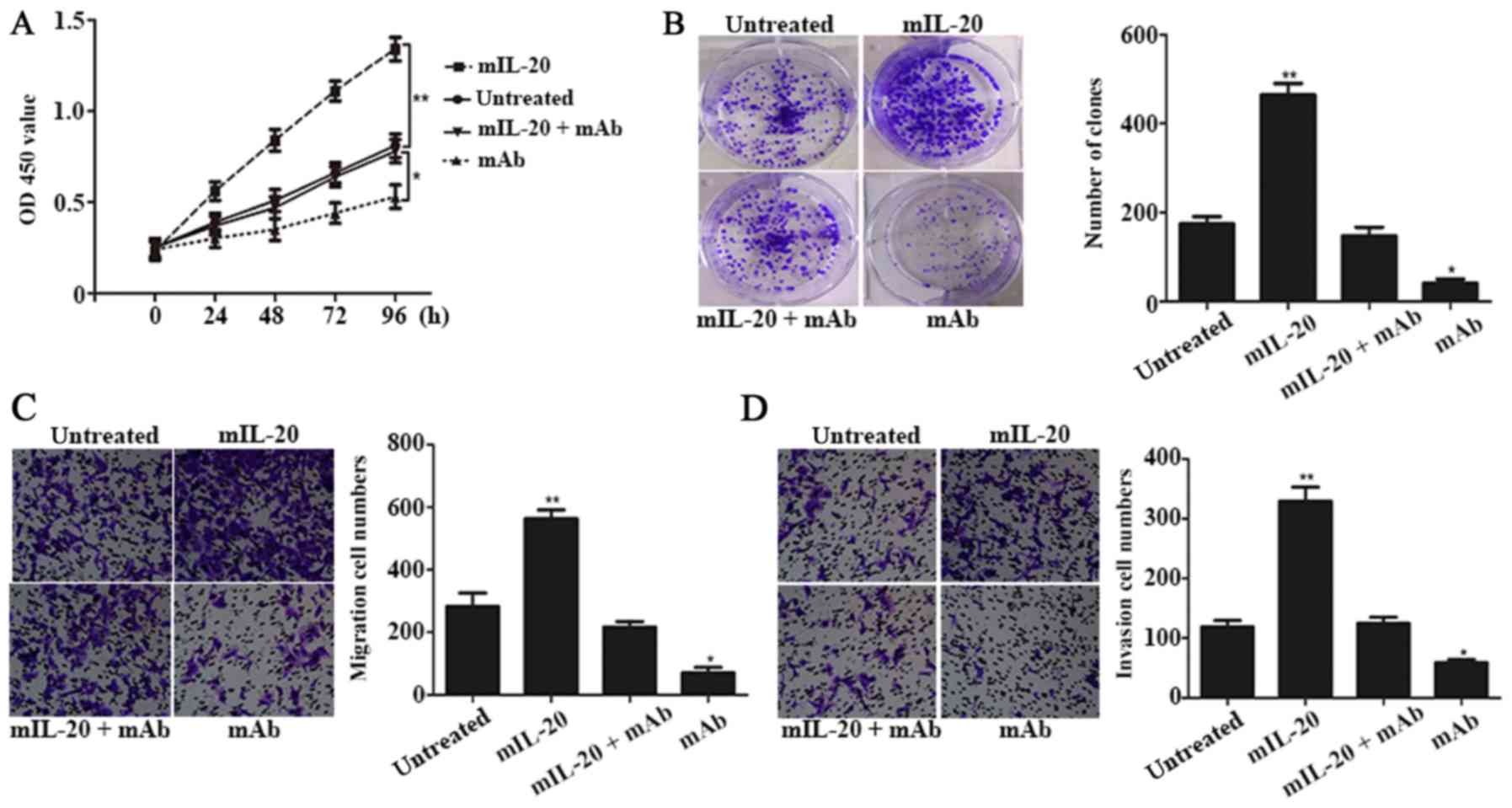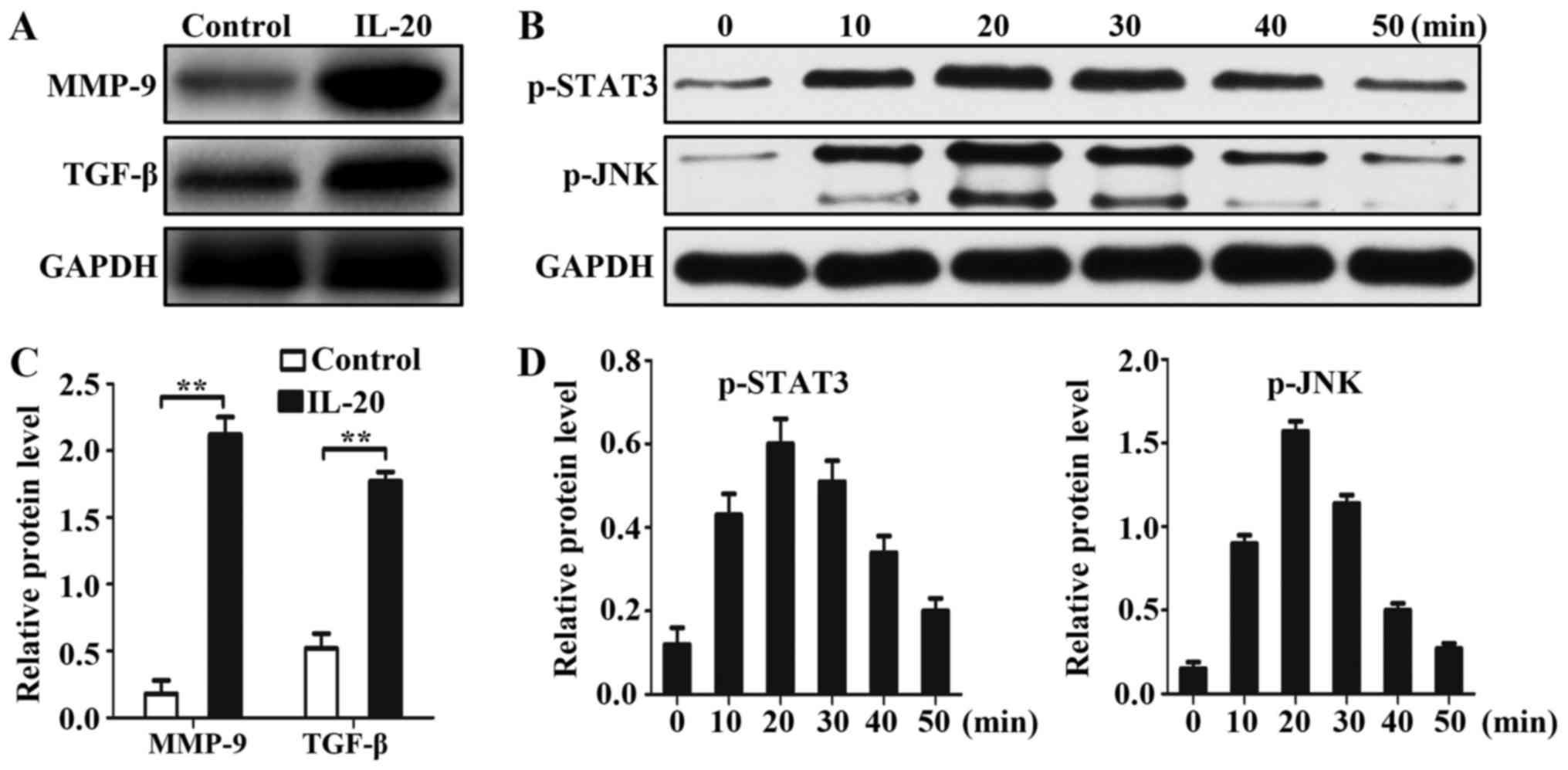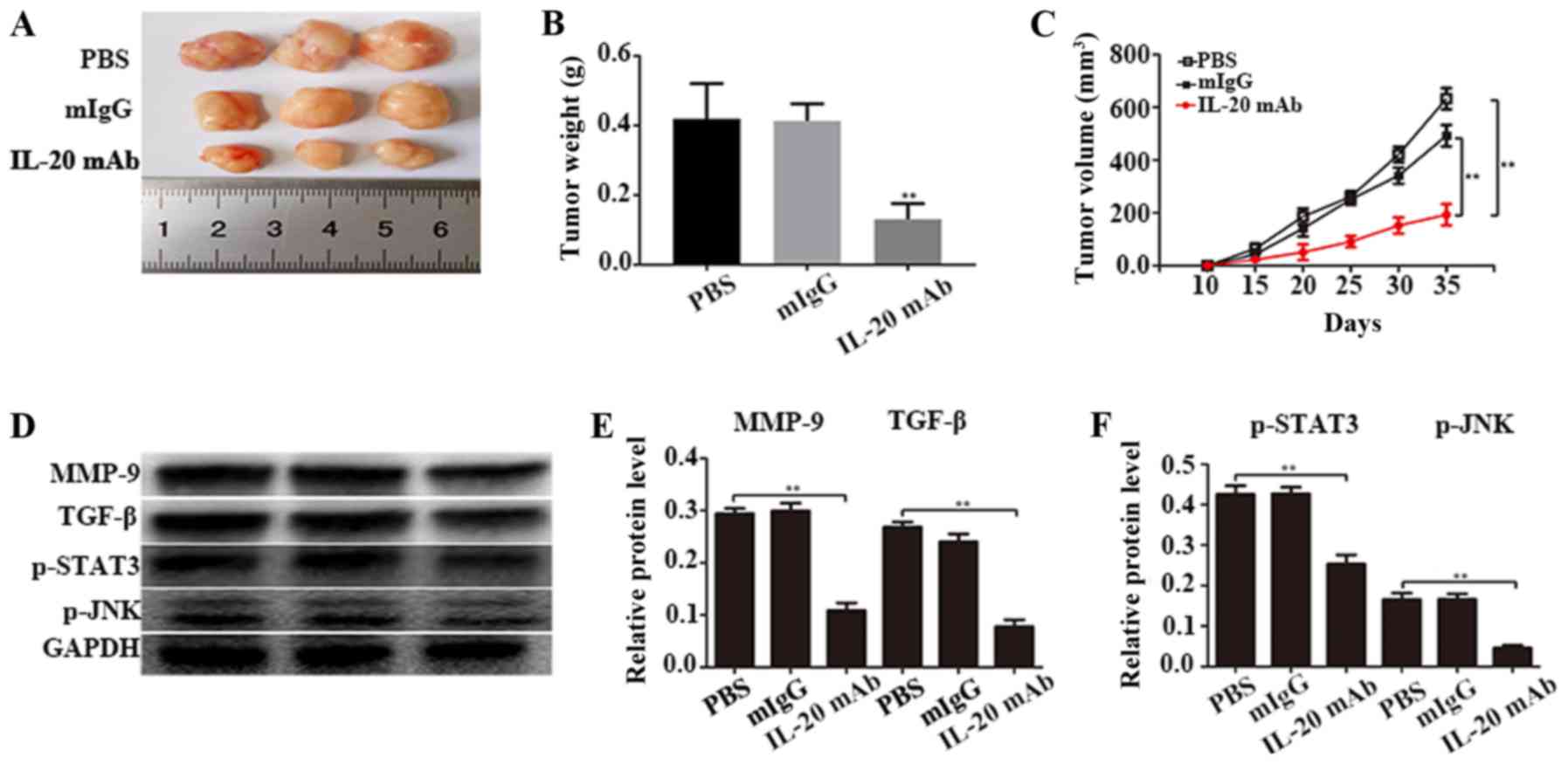|
1
|
Venook AP, Papandreou C, Furuse J and de
Guevara LL: The incidence and epidemiology of hepatocellular
carcinoma: A global and regional perspective. Oncologist. 154 Suppl
4:S5–S13. 2010. View Article : Google Scholar
|
|
2
|
Chen W, Zheng R, Baade PD, Zhang S, Zeng
H, Bray F, Jemal A, Yu XQ and He J: Cancer statistics in China,
2015. CA Cancer J Clin. 66:115–132. 2016. View Article : Google Scholar : PubMed/NCBI
|
|
3
|
Sabat R: IL-10 family of cytokines.
Cytokine Growth Factor Rev. 215:315–324. 2010. View Article : Google Scholar
|
|
4
|
Rutz S, Wang X and Ouyang W: The IL-20
subfamily of cytokines-from host defence to tissue homeostasis. Nat
Rev Immunol. 14:783–795. 2014. View
Article : Google Scholar : PubMed/NCBI
|
|
5
|
Wegenka UM: IL-20: Biological functions
mediated through two types of receptor complexes. Cytokine Growth
Factor Rev. 21:353–363. 2010. View Article : Google Scholar : PubMed/NCBI
|
|
6
|
Blumberg H, Conklin D, Xu WF, Grossmann A,
Brender T, Carollo S, Eagan M, Foster D, Haldeman BA, Hammond A, et
al: Interleukin 2: Discovery, receptor identification, and role in
epidermal function. Cell. 104:9–19. 2001. View Article : Google Scholar : PubMed/NCBI
|
|
7
|
Wei CC, Hsu YH, Li HH, Wang YC, Hsieh MY,
Chen WY, Hsing CH and Chang MS: IL-20: Biological functions and
clinical implications. J Biomed Sci. 13:601–612. 2006. View Article : Google Scholar : PubMed/NCBI
|
|
8
|
Gedebjerg A, Johansen C, Kragballe K and
Iversen L: IL-20, IL-21 and p40: Potential biomarkers of treatment
response for ustekinumab. Acta Derm Venereol. 93:150–155. 2013.
View Article : Google Scholar : PubMed/NCBI
|
|
9
|
Hsu YH, Hsing CH, Li CF, Chan CH, Chang
MC, Yan JJ and Chang MS: Anti-IL-20 monoclonal antibody suppresses
breast cancer progression and bone osteolysis in murinemodels. J
Immunol. 188:1981–1991. 2012. View Article : Google Scholar : PubMed/NCBI
|
|
10
|
Lee SJ, Cho SC, Lee EJ, Kim S, Lee SB, Lim
JH, Choi YH, Kim WJ and Moon SK: Interleukin-20 promotes migration
of bladder cancer cells through extracellular signal-regulated
kinase (ERK)-mediated MMP-9 protein expression leading to nuclear
factor (NF-κB) activation by inducing the up-regulation of
p21(WAF1) protein expression. J Biol Chem. 288:5539–5552. 2013.
View Article : Google Scholar : PubMed/NCBI
|
|
11
|
Wegenka UM, Dikopoulos N, Reimann J, Adler
G and Wahl C: The murine liver is a potential target organ for
IL-19, IL-20 and IL-24: Type I Interferons and LPS regulatethe
expression of IL-20R2. J Hepatol. 46:257–265. 2007. View Article : Google Scholar : PubMed/NCBI
|
|
12
|
Chiu YS, Wei CC, Lin YJ, Hsu YH and Chang
MS: IL-20 and IL-20R1 antibodies protect against liver fibrosis.
Hepatology. 60:1003–10014. 2014. View Article : Google Scholar : PubMed/NCBI
|
|
13
|
Livak KJ and Schmittgen TD: Analysis of
relative gene expression data using real-time quantitative PCR and
the 2(-Delta Delta C(T)) method. Methods. 25:402–408. 2001.
View Article : Google Scholar : PubMed/NCBI
|
|
14
|
Zhang Z, Zhang Y, Sun XX, Ma X and Chen
ZN: Chen, microRNA-146a inhibits cancer metastasis by
downregulating VEGF through dual pathways in hepatocellular
carcinoma. Mol Cancer. 14:52015. View Article : Google Scholar : PubMed/NCBI
|
|
15
|
Ji Y, Fan J, Zhang L, Tan Y, Zhou J, Zeng
H, Ren Z and Xu J: Analysis of signal pathway activation in
hepatocellular carcinoma: Association with clinical outcomes to
sorafenib in Chinese patients. J Clin Oncol. 20:272009.
|
|
16
|
Liu J, Chen S, Wang W, Ning BF, Chen F,
Shen W, Ding J, Chen W, Xie WF and Zhang X: Cancer-associated
fibroblasts promote hepatocellular carcinoma metastasis through
chemokine-activated hedgehog and TGF-β pathways. Cancer Lett.
379:49–59. 2016. View Article : Google Scholar : PubMed/NCBI
|
|
17
|
Lu L, Zhang Q, Wu K, Chen X, Zheng Y, Zhu
C and Wu J: Hepatitis C virus NS3 protein enhances cancer cell
invasion by activating matrix metalloproteinase-9 and
cyclooxygenase-2 through ERK/p38/NF-κB signal cascade. Cancer Lett.
356:470–478. 2015. View Article : Google Scholar : PubMed/NCBI
|
|
18
|
He G, Yu GY, Temkin V, Ogata H, Kuntzen C,
Sakurai T, Sieghart W, Peck-Radosavljevic M, Leffert HL and Karin
M: Hepatocyte IKKβ/NF-κB inhibits tumor promotion and progression
by preventing oxidative stress-driven STAT3 activation. Cancer
Cell. 17:286–297. 2010. View Article : Google Scholar : PubMed/NCBI
|
|
19
|
Chang Q, Zhang Y, Beezhold KJ, Bhatia D,
Zhao H, Chen J, Castranova V, Shi X and Chen F: Sustained JNK1
activation is associated with altered histone H3 methylations in
human liver cancer. J Hepatol. 50:323–333. 2009. View Article : Google Scholar : PubMed/NCBI
|
|
20
|
Hibi M, Lin A, Smeal T, Minden A and Karin
M: Identification of an oncoprotein- and UV-responsive protein
kinase that binds and potentiates the c-Jun activation domain.
Genes Dev. 7:2135–2148. 1993. View Article : Google Scholar : PubMed/NCBI
|
|
21
|
Eferl R, Ricci R, Kenner L, Zenz R, David
JP, Rath M and Wagner EF: Liver tumor development: c-Jun
antagonizes the proapoptotic activity of p53. Cell. 112:181–7192.
2003. View Article : Google Scholar : PubMed/NCBI
|
|
22
|
Giannelli G, Koudelkova P, Dituri F and
Mikulits W: Role of epithelial to mesenchymal transition in
hepatocellular carcinoma. J Hepatol. 65:798–808. 2016. View Article : Google Scholar : PubMed/NCBI
|


















